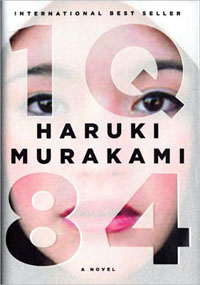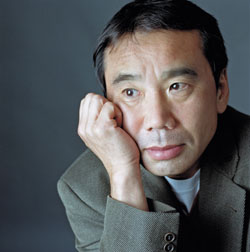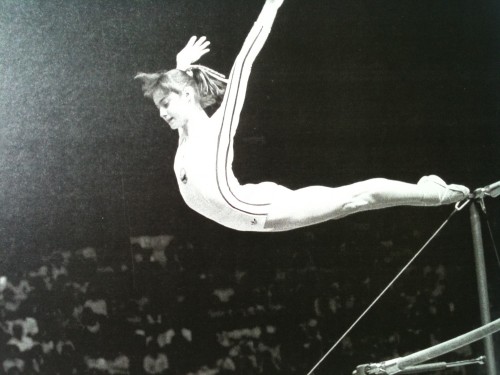IQ84: Three Reviews
 IQ84
IQ84
by Haruki Murakami
Knopf, 2011.
944 pages / $30.50 Buy from Amazon
One
Please do not read this or any other review if you intend to read IQ84. A Murakami novel is best read without knowledge of its plot.
Few books are about life itself.
Part of the reason we live is to see what happens next. Will we go to college? Go on a road trip? Whom will we marry? When? Will we have children? Will we move? Will we get that job? Meet eyes with a girl who reminds us of someone we once knew? What will we have for dinner?
IQ84 is alive with its own life. Start from the beginning and see what happens next. The less you know, the more fun the discovery will be. All you need to know is this:
The book takes place in Tokyo. There are two main characters, Tengo and Aomame. You must bring to this book your own preconceptions about everything—God, existence, love, morality—not mine or anyone else’s. Your reading will be your own.
Your wrists may hurt as you read—the novel is almost 1000 pages. It’s a heavy tome because it’s a whole universe. The pain in your wrists will be worth the wormhole.
Now get out of here.
January 13th, 2012 / 12:00 pm
Book + Beer: Murakami and Flat12
Cats. Clinical sex. Whipping up a quick miso soup. Music. Two fingers of bourbon before you go to bed. Psychic teenagers and the Sheep Man. Wells and tunnels. A quest. Death and loss. You know the material. Who in the fuck even reads Murakami? Go ahead, take my Indie Card away. (It wasn’t doing much for me anyway, expect for the 10% discount on skinny eyeglasses.) Sometimes I’m just in the mood. A sort of literary sorbet. Yo, H, how did you get into writing?
In April 1978, I was watching a baseball game in the Jingu Stadium in Tokyo, the sun was shining, I was drinking a beer. And when Dave Hilton of the Yakult Swallows made a perfect hit, at that instant I knew I was going to write a novel.
Oh fuck off, dude.
As someone here said once, Murakami can really write about food. And drinking beer.
Last night I was at this reading In Indianapolis and had several Flat 12 Half Cycle IPAs. The Half Cycle is so named due to its blending of single and double IPA characteristics. Extremely hoppy! Made dry hopped with a pound of high alpha American hops in every barrel! (You are allowed to use three exclamation marks your entire writing life, and I just used two.) Shit. I could feel the alcohol fluttering through my mouth, into brain, fluttering past brain, into ceiling. I felt like a tube. The ceiling was golden.
5 required test of the status of the gouts of yellow snot of
11. I never understand what a translator must feel. To “guess” what word might represent the author’s intent. Like dancing about architecture or fucking about bowling parties, I’m sure. Here is a fascinating interview about translating Haruki Murakami.
55. At a thousand thousands, Sam Lipsyte reads Hob Broun.
5. There is no # 5. Ok, this: Taylor Swift is vacuous. So there is no # 5.
14444. Sean D. Kelly writes an essay about Scylla, blow-driers, Charybdis of religious delusion, the conditions of thigh chaffing and self-deception, the dancer as the dance, and the anxiety and nihilism of George Michael/Nietzschean post-God secularism. Well done, sir. And worth your time. Click. Trust me.
7. Hey you opinionated cacafuegos. What makes bad writing bad? This is sharp blow glow. Watch:
httpv://www.youtube.com/watch?v=raWLS2_PEfI
There’s no rule that says you get steadily better.
I had a big Hemingway boner.
It’s pretty bad.
I like Haruki Murakami a lot

First off, I do think Murakami is over-rated, but that doesn’t mean he’s not good. I only like two of his books, but I like them immensely: Wind-up bird Chronicle and Kafka on the Shore. His ideas are sometimes corny, but overall I think he’s onto something.
His other books, especially the ones like Norwegian Wood where he goes on about Jazz and girls, I think is stupid—like he’s trying to be F. Scott Fitzgerald, sentimental or even self-satisfied about his lifestyle.
I much more like it when Murakami tries to be Pynchon or Borges. I say ‘tries to be’ because I think Murakami is not original, but he takes existing ideas or methods about/in fiction and his mark is his ability to make it seem like he invented the style. At the same time, he’s not trying to be post-modern the way Delillo tries, or Barth tried. His style is re-appropriation and the audacity to not be ironic about it. He’s an ‘earnest original fraud,’ and I like him a lot.
WUBC starts off with a guy making spaghetti and listening to the radio when the phone rings. I’ve read that part over many, many times and I don’t understand how he did it, but that scene is just as grotesque as Gregor Samsa waking up as a bug. It’s like there’s something ‘wrong’ with the scene. Murakami’s genius is his ability to evoke feelings that are completely uncorrelated with the actual printed words. His novels ‘happen’ outside the words.
KOTS uses alternating chapters to describe two narratives, which is gimmicky I know, but he handles it very well. Near the middle of the book I said, “wait a minute — this is the same story, merely synopated,” that the odd chapters somehow melded into the chasms introduced in the even chapters. It was like entropy: a closed system with two parts, each of which began permeating into the other. I’m usually skeptical about the device of ‘dreams’ in fiction, but KOTS was itself a dream — like the logic was not rational yet made sense, the way we accept random images in our dreams. It lacks Gaddis’s intricacy, but is yet is formally resolved. Murakami, at his best, transcends the formal constraints of time, lineage, narrative, character, etc. His books are dreams that make sense, while not relying on ‘dreams’ to resolve the formal disparities. I can’t describe how he does it, it’s just Murakami.
Whenever I want to be confused and feel like there are Japanese people everywhere, I either go to Japantown or read Murakami. I like him a lot.

